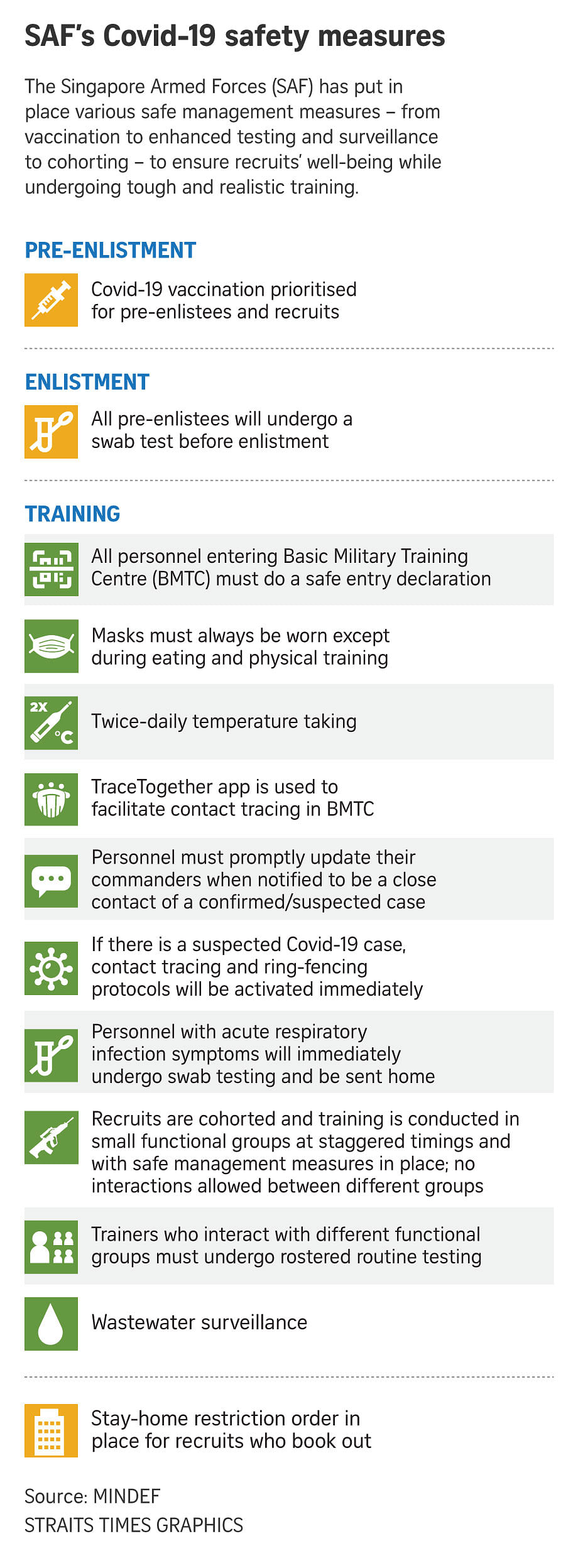SINGAPORE - The Singapore Armed Forces (SAF) can minimise disruptions to activities involving national servicemen when Covid-19 infections arise as it has achieved herd immunity through vaccination, said Defence Minister Ng Eng Hen.
It will not have to close its training institutes and can also ease restrictions to allow units to operate at maximum effectiveness, he added, as he set out the SAF's shift towards living with the disease.
More than 90 per cent of SAF and Ministry of Defence (Mindef) personnel have received their first dose of the Covid-19 vaccine, said Dr Ng. By the second week of July, 92 per cent will be fully vaccinated with both doses.
"That is quite satisfactory. It means that the SAF has achieved herd immunity," he said, adding that the SAF has moved ahead of the national curve.
This means the disease will be mild even if servicemen were to be infected.
Dr Ng was giving an interview on Monday (June 28) at Mandai Hill Camp ahead of SAF Day on July 1, in which he outlined how the SAF will deal with a "new normal" where Covid-19 is endemic.
SAF units cannot have the equivalent of a circuit breaker, or even a phase two (heightened alert), he said, noting the continuing threats facing Singapore, from terrorism to maritime security.
"For the SAF, it must execute your security functions without unnecessary restraints, but be prepared to isolate small groups if infections arise," he added.
The vaccination rate does not include operationally ready national servicemen (NSmen). The first batch of SAF soldiers received their first doses in mid-January.
While vaccinations will be the "mainstay", testing and surveillance will also be strengthened, Dr Ng said. Cohorting, or having split-team arrangements, will continue so that the smallest group possible can be shut down, without affecting the rest of the unit.
With an endemic disease, the assumption is that there will be Covid-19 cases within the SAF, he said. "But when infections occur, the measures that you take are much less than in an epidemic."
When infections arise, training schools such as the Basic Military Training Centre, Officer Cadet School or the Specialist Cadet School need not be closed. "We can avoid disruption to NS activities. Certainly we can't shut down and we won't shut down critical operations units," he added.
Critical operations units, such as those protecting key installations, performing air defence or maritime security operations, continued operating throughout the pandemic last year.
However, basic military training was suspended from April to May last year during the national circuit breaker period, with about 3,400 recruits doing home-based learning and going out only for essential activities.
Some in-camp training and fitness activities for NSmen were also halted temporarily last month, with the rise in community Covid-19 cases. These have resumed from Monday.
Drawing a comparison with the H1N1 pandemic in Singapore in 2009, Dr Ng noted that Singapore had recorded more than 400,000 cases of the disease, compared with about 60,000 cases of Covid-19 so far.
About 1,300 were hospitalised for H1N1, compared with about 3,800 for Covid-19. In terms of deaths, 18 died from H1N1 and 36 so far from Covid-19.
As more people get vaccinated against Covid-19, "we can actually move towards the way we treated and dealt with H1N1, which is basically self-testing and self-isolation", he said.
"Living with an endemic disease means that, fundamentally, we carry out our activities with the risk of infection always there. We reduce the risk because we can't eliminate it. So it's quite a different mindset."
Meanwhile, high-end overseas training has continued, he said. For instance, the navy continued with the Rim of the Pacific Exercise last year, and the air force took part in Exercise Red Flag - Nellis - a large-scale air combat exercise in the United States - in March this year.
In September, the air force and the army will conduct Forging Sabre, an integrated live-firing exercise in the US, said Dr Ng.
Exercise Wallaby - traditionally the SAF's largest overseas exercise - was called off last year due to the pandemic. It could take place this year, pending approval from the authorities, although it would unlikely be on the same scale as it was before Covid-19 hit.
To boost protection against Covid-19, pre-enlistment vaccinations were rolled out this month for military recruits before they enter the Basic Military Training Centre (BMTC).
Across the SAF, front-line personnel such as the Republic of Singapore Navy's Accompanying Sea Security Teams and army soldiers who conduct protection of installation operations have been placed on rostered routine testing.
Operationally ready national servicemen (NSmen) who returned for their in-camp training since last October have also undergone routine testing.
Faster and less invasive testing methods are also being studied, such as rapid antigen tests that use saliva, do-it-yourself test kits, or breathalysers.
Dr Ng was asked if disruptions to SAF activities could still be expected under certain conditions, as it adapts to an endemic Covid-19.
He said a new, more infectious and lethal variant of the virus, should it arise, would be "an entirely new ballgame".
"The vaccine isn't as effective, and you have to basically recalculate the risk. But barring that exception, we can continue as we have done," he added.



